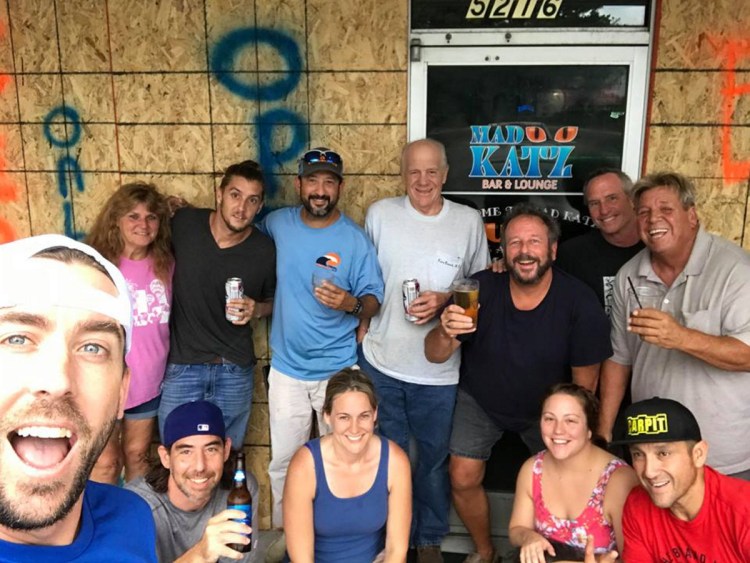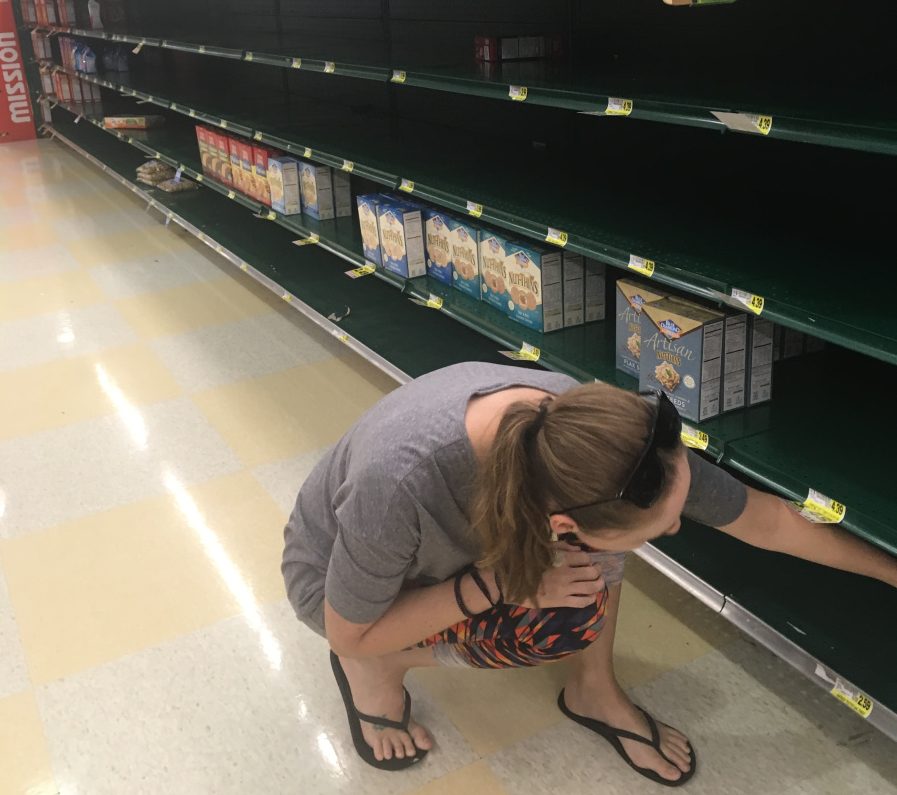Hurricane Florence is scheduled to make landfall more than 800 miles away from Maine, but many people with ties to the state could be affected by the Category 2 storm.
Officials say more than 10 million people are at risk because of the storm’s “uncertain track.”
According to the Associated Press, the storm was barreling toward southern North Carolina but shifted southwest toward Georgia. At 2 p.m. Thursday, wind gusts were as high as 130 mph. The storm was a Category 2 hurricane and was projected to make landfall early Friday morning and then be downgraded to a Category 1 before degenerating further as it turns northeast.
Accuweather estimates that Florence will cause $30 billion to $60 billion in economic impact and damage.
Maine will be relatively unaffected by the storm. News Center Maine Meteorologist Ryan Breton said Wednesday that Maine will experience some high surf — around 4 to 6 feet. That surf was expected to lead to dangerous rip currents, possibly causing minor beach erosion Thursday night. The high surf could last into Friday, and some precipitation lingering from the storm could hit Maine early next week.
Wilmington, North Carolina, resident Tim Cramer, 37, an Erskine Academy graduate formerly of South China, works as a bartender. The bar at which he works, Mad Catz, is about 6 miles from the beach but stayed open until Thursday afternoon, he said.
“We’re watching (hurricane coverage) here on the TVs at the bar,” he said. “You kind of just have to play it by ear.”
Cramer moved to Wilmington nine years ago and has experienced three hurricanes in that time, but he said it is usually spared from the most catastrophic damage of storms.
“This town is pretty resilient,” he said. “You know you’re in a hurricane-prone area, (but) we luck out very much.”
Cramer said he would be hunkering down with his dogs during the storm. He said he has stocked up on food and water for the occasion, and most stores’ shelves are empty.
“Mother Nature is going to do what it’s going to do,” he said. “As far as I’m concerned, I’m ready to go.”
Cramer also said the news media coverage of hurricanes is usually sensational, but it helps clear out areas that could be dangerous. He said he thought some of the coverage was over-the-top, but there are some serious concerns about the coming storm.
“It’s nothing to kid about, but there is a sense of calmness here because it was downgraded,” he said. “It’s always good to be prepared, but it’s overblown every time there’s a hurricane.
“I’m nervous for the flooding and the power outages,” Cramer added.
He said he would fill his bathtub with water in anticipation of the storm for the first time. He expected to be without power in his second-floor apartment for three or four days.
Cramer said the bar was remarkably busy Tuesday, which he attributed to the liquor stores closing earlier in the week.
David Redlon, formerly of Windham but now of Myrtle Beach, South Carolina, told the Portland Press Herald on Wednesday that he also planned on hunkering down during the storm.
Plenty of people decided to flee the coast this week, even if it wasn’t an easy choice.
Two of those people were Sherri and Andrew Woodard, retirees who moved to Wilmington about four years ago after living in Vassalboro for 32 years.
Sherri Woodard, 67, a North Carolina native who used to work as the chief nursing officer at MaineGeneral Medical Center in Augusta, said they decided to leave after hearing that the hurricane could be a category 3 or 4. They also spoke with neighbors who had lived through some large storms and decided to leave this week.
Now they’re staying with relatives who live about 220 miles inland. Before leaving, they moved potted plants and outdoor furniture into their garage, to prevent them from flying around in the storm, and stocked up on water and other provisions.
They left on Wednesday, driving west in their Hyundai sport utility vehicle and hitting some traffic in Raleigh.
“I think it was the right decision,” Sherri Woodard said Thursday, “but it does give you a very weird feeling to leave your home and not know what’s going to be there when you come back, or not know when you’re going to come back.”
She also expressed sympathy for those people who didn’t have the means to evacuate the region.
Kaylie Conti, who recently moved from Winslow to Wilmington, said her husband, two dogs and a cat recently evacuated their home to stay in Durham, North Carolina, more than 150 miles north of Wilmington.
“We just bought the house,” she said. “It’s terrifying not (to) know if you’re going to come back to anything.”
Conti, who is four months pregnant, said her home was directly in the line of the storm, and the couple was forced to evacuate. She said the threat of a hurricane is vastly different from the threat of snowstorms Mainers are used to.
“It is absolutely terrifying,” she said. “I’ve been through blizzards and ice storms and everything.
“You get buried under 4 feet of snow and that’s all right,” she added. “(Now) we have no idea what to expect.”
Steve Curtis, a Cony High School graduate and former Augusta resident now living in Chesapeake, in southeastern Virginia, got some good news earlier this week when the projected track of Hurricane Florence changed. The storm’s course initially was expected to come his way, prompting mandatory evacuations in his neighborhood, but it changed to a path more to the south toward the Carolinas.
But he realizes what may be good storm news to him could be quite the opposite for those in the hurricane’s latest projected path.
“I feel sorry for the people in the Carolinas. I lived through Hurricane Isabel here. We lost power for 14 days,” said Curtis, who has lived in Virginia since 1988, reflecting back on the 2003 hurricane that caused more than $5 billion in damage when it came ashore with wind of 105 mph. “I feel for them people.”
Curtis said Tuesday schools were closed and a lot of stores and even pharmacies there already were closed, because the people who worked in them had evacuated the area.
Some people in his own neighborhood were required to evacuate, but Curtis said his home is on some of the higher ground in the neighborhood, so he wasn’t ordered to leave. The area is divided into zones, based on the likelihood of flooding, and he lives in a zone not expected to flood. Areas that are more flood-prone were evacuated.
He said some areas near him flooded earlier this week, just from the high tide. Curtis said the area has gotten a lot of rain this year, and he feared high wind could bring down a lot of trees, with the soil so saturated with water.
Early in the week he stocked up on water and canned goods, and he made sure flashlights and batteries worked and that the propane tank for his grill and his vehicles’ gas tanks were full.
Meanwhile, others from Maine were headed toward the storm to lend a hand.
John Cordts, 68, of Lisbon, is part of a small volunteer crew with the American Red Cross charged with setting up an emergency shelter at the Dublin United Methodist Church in Dublin, Virginia, about 100 miles from Virginia Beach.
“That consists of housing and feeding people who come because their property and life is in danger,” he said Thursday afternoon.
He said the biggest concern in Dublin, which is in southwestern Virginia, would be flooding. The town has received above-average rainfall this year, and heavy rain from the storm could cause waterways in town to overflow.
Cordts, who has been a Red Cross volunteer for five years, said he was involved in relief efforts last year after Hurricane Harvey in Texas. He was in the second wave of relief efforts when infrastructure was put in place, but in Virginia he is helping set up that infrastructure. Because of the hurricane’s course, his team, along with 15 other teams in the region, might have to pack up quickly to assist in harder-hit areas.
“There’s a lot of uncertainties, and you have to be flexible,” Cordts said. “If those shelters are not needed, people will have to pick up and leave.”
He said spirits were high in Dublin, where most residents are not evacuating. He said volunteers — who sign on for a minimum stint of two weeks — are usually free from worry and willing to go wherever they are needed.
“You can’t be worried to do this type of thing,” he said. “You just have to go with the flow, (and) you have to have a sense of humor and take it as it comes.”
Staff Writers Keith Edwards and Charles Eichacker contributed to this report.
Sam Shepherd — 621-5666
Twitter: @SamShepME
Copy the Story LinkSend questions/comments to the editors.






Success. Please wait for the page to reload. If the page does not reload within 5 seconds, please refresh the page.
Enter your email and password to access comments.
Hi, to comment on stories you must . This profile is in addition to your subscription and website login.
Already have a commenting profile? .
Invalid username/password.
Please check your email to confirm and complete your registration.
Only subscribers are eligible to post comments. Please subscribe or login first for digital access. Here’s why.
Use the form below to reset your password. When you've submitted your account email, we will send an email with a reset code.